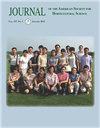Comparative Analysis of Complete Chloroplast Genomes of Gardenia jasminoides and Contribution to the Phylogeny and Adaptive Evolution
IF 1.1
4区 农林科学
Q3 HORTICULTURE
Journal of the American Society for Horticultural Science
Pub Date : 2022-09-01
DOI:10.21273/jashs05225-22
引用次数: 0
Abstract
Gardenia jasminoides, belonging to the Rubiaceae family, is widely distributed and planted in China. It has traditionally been used as an ornamental and medicinal plant in several Asian countries. The rapid development of high-throughput sequencing technology makes it feasible to obtain complete chloroplast (cp) genome sequences and will deepen our understanding of evolution of G. jasminoides. In this study, we sequenced the complete cp genomes of two botanical varieties of G. jasminoides. The complete cp genomes of both botanical varieties of G. jasminoides showed highly conserved structures and the length was 154,954 base pairs (bp) for G. jasminoides var. radicans (GJR) and 155,098 bp for G. jasminoides var. grandiflora (GJG). A total of 132 and 133 genes were identified in GJR and GJG, respectively. The cp genomes of two newly sequenced G. jasminoides were further compared with two published G. jasminoides cp genomes. Multiple repeats and simple sequence repeats (SSRs) were detected among different genotypes of G. jasminoides. The intron sequences of rps16 and rpl16 genes were slightly divergent among four genotypes of G. jasminoides. Phylogenetic analyses based on the complete cp genome sequences showed that G. jasminoides was closely associated with Fosbergia shweliensis, with Coffea as their close relative. Taken together, the complete cp genomes of GJG and GJR provided significant insights and important information that can be used to identify related species and reconstruct their phylogeny.栀子叶绿体全基因组的比较分析及其在系统发育和适应进化中的贡献
栀子属茜草科,在我国广泛分布和种植。在一些亚洲国家,它传统上被用作观赏植物和药用植物。高通量测序技术的快速发展使获得完整的叶绿体(cp)基因组序列成为可能,并将加深我们对茉莉花进化的理解。在本研究中,我们对两个茉莉属植物品种的完整cp基因组进行了测序。两个茉莉属植物品种的完整cp基因组显示出高度保守的结构,其长度分别为154954个碱基对(bp)(根型茉莉)和155098bp(大花型茉莉)。在GJR和GJG中分别鉴定出132和133个基因。将两个新测序的茉莉花的cp基因组与两个已发表的茉莉花cp基因组进行了进一步的比较。在不同基因型的茉莉中检测到多个重复序列和简单序列重复序列。在四种茉莉花基因型中,rps16和rpl16基因的内含子序列略有差异。基于完整cp基因组序列的系统发育分析表明,jasminoides与什韦里Fosbergia shweliensis亲缘关系密切,Coffea是它们的近亲。总之,GJG和GJR的完整cp基因组提供了重要的见解和信息,可用于识别相关物种并重建其系统发育。
本文章由计算机程序翻译,如有差异,请以英文原文为准。
求助全文
约1分钟内获得全文
求助全文
来源期刊
CiteScore
3.80
自引率
0.00%
发文量
31
审稿时长
2 months
期刊介绍:
The Journal of the American Society for Horticultural Science publishes papers on the results of original research on horticultural plants and their products or directly related research areas. Its prime function is to communicate mission-oriented, fundamental research to other researchers.
The journal includes detailed reports of original research results on various aspects of horticultural science and directly related subjects such as:
- Biotechnology
- Developmental Physiology
- Environmental Stress Physiology
- Genetics and Breeding
- Photosynthesis, Sources-Sink Physiology
- Postharvest Biology
- Seed Physiology
- Postharvest Biology
- Seed Physiology
- Soil-Plant-Water Relationships
- Statistics

 求助内容:
求助内容: 应助结果提醒方式:
应助结果提醒方式:


